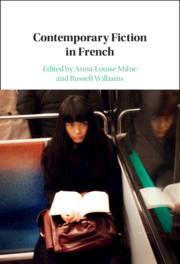Book contents
- Contemporary Fiction in French
- Contemporary Fiction in French
- Copyright page
- Contents
- Figures
- Notes on Contributors
- Introduction
- Chapter 1 Mediterranean Francophone Writing
- Chapter 2 After the Experiment
- Chapter 3 Getting a Future
- Chapter 4 Contemporary French Fiction and the World
- Chapter 5 The Franco-American Novel
- Chapter 6 Graphic Novel Revolution(s)
- Chapter 7 ‘Back in the USSR’
- Chapter 8 Fictions of Self
- Chapter 9 Trauma, Transmission, Repression
- Chapter 10 Wretched of the Sea
- Chapter 11 Urban Dystopias
- Chapter 12 Imagining Civil War in the Contemporary French Novel
- Notes
- Select Secondary Bibliography
- Index
Chapter 1 - Mediterranean Francophone Writing
Published online by Cambridge University Press: 30 March 2021
- Contemporary Fiction in French
- Contemporary Fiction in French
- Copyright page
- Contents
- Figures
- Notes on Contributors
- Introduction
- Chapter 1 Mediterranean Francophone Writing
- Chapter 2 After the Experiment
- Chapter 3 Getting a Future
- Chapter 4 Contemporary French Fiction and the World
- Chapter 5 The Franco-American Novel
- Chapter 6 Graphic Novel Revolution(s)
- Chapter 7 ‘Back in the USSR’
- Chapter 8 Fictions of Self
- Chapter 9 Trauma, Transmission, Repression
- Chapter 10 Wretched of the Sea
- Chapter 11 Urban Dystopias
- Chapter 12 Imagining Civil War in the Contemporary French Novel
- Notes
- Select Secondary Bibliography
- Index
Summary
At the core of this volume stands the proposition that the conjoined forces of globalization and increased transnational mobility are forging new forms of social and cultural transactions which bypass the usual pattern of dominance between France and its ex-colonies. Against the straitjacket of centre/periphery critical models, the recoding of ‘French literature’ as ‘literature in French’ favours reading protocols that liberate the production hailing from France’s former empire from colonial binaries. This focus on physical mobility and fluid cultural interactions productively upsets the indexing of literary value to predominant metropolitan norms and canonical forms. Instead, through its spatial deployment, this volume’s multifarious ‘scape’ of the contemporary stresses the need to devise critical frameworks cognizant of the diffracted, polycentric reality of our world – particularly models that would rid taxonomies of French-language literature of monolingual, Francocentric perspectives borne of the endless aftermath of colonialism. Drawing from the forces of globalization and its disjunctive methodology, this project brings the Francophone into dialogue with other linguistic and cultural logics – through the adoption of new, diffuse spatial coordinates, and also, as I will argue in the case of the Maghreb, through the examination of the intricate historical entanglements extending far beyond French colonialism that have brought the world’s diversity to impact on literary writing in French.
- Type
- Chapter
- Information
- Contemporary Fiction in French , pp. 17 - 33Publisher: Cambridge University PressPrint publication year: 2021



